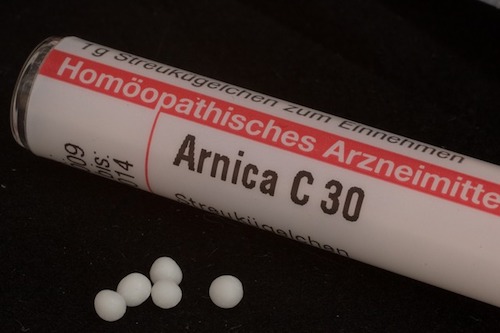
We take a look at the health benefits of Arnica to see how useful the homeopathic treatment can be.

Arnica has been in use for many years as a natural remedy, enjoying popularity as part of homeopathic treatments since approximately the 1500s.
At a basic level, many people use arnica as a plant-based pain reliever, particularly for ailments including arthritis or sports-related injuries.
Below, we’ll look at the health benefits of arnica in detail, as well as its origins, the different forms that it takes, and its potential side effects.
Some of the links below are affiliate links, meaning, at no additional cost to you, we may make a commission if you click through and make a purchase.
What is Arnica?
Another name for arnica is leopard’s bane or wolf’s bane, the latter likely being the most recognizable of the terms given to it. It is a perennial flowering plant that is often mistaken for being a daisy, owing to the similarity in appearance, with bright yellow flowers. The flower occurs naturally in a number of countries, including Europe, some parts of Russia, and woodlands within North America.

The flower heads are taken from this plant and processed through something called ‘steam distillation’ or ‘CO2 extraction.’ From here, they are used to produce the pure essential oil before it is combined with another carrier oil; this results in the consumer-ready arnica oil that you can pick up in stores.
Why use Arnica?
Arnica is mainly used to treat physical injuries and even illnesses like arthritis. Here are a few popular uses for the natural medicine:
- Arnica for Bruises
Arnica is said to be one of the more potent natural remedies for the quickened healing of bruises. Bruises are a direct result of impact trauma to the body, which breaks blood vessels underneath the skin. Soreness and discoloration occurs as a result. When applied to bruises, arnica can help to increase the number of white blood cells targeted to the injury, which can in turn clear up the bruise more quickly.
- Arnica for Pain Relief
Arnica can also function as a natural form of pain relief; unlike over-the-counter medicines, rather than hiding the pain, it directly stimulates the body’s natural healing ability. The injuries for which Arnica is often recommended include trauma, or painful inflammation resulting from a long-term illness like arthritis.
- Arnica for Swelling
Arnica also acts as a natural anti-inflammatory remedy, with a reputation for its capability of reducing localized swelling. As a result, it could be useful for minor injuries such as sprains and strains, or to reduce swelling after a minor operation.
Applications of Arnica
Like many other homeopathic remedies, arnica comes in many forms, including topical applications and consumables. Some are more effective than others.
Topical applications
Topical arnica products can be found in many stores and are among the easiest products of their type to find. However, there are differences in ingredients and potency between arnica cream, arnica gel, arnica salves and so on. The smell, texture and consistency of the topical treatment can be a major deciding factor in whether to use one product over another.

When it comes to deciding on which topical application to use, you should be sure to investigate all the ingredients, particularly those labelled as ‘inactive,’ as this section will indicate what oils, odors and other properties will shape the product. It’s also essential to check the active ingredients in case of any allergies.
Oral applications
Arnica pills and arnica tablets are some of the most common oral applications, and commonly used for pain relief. Unlike many over-the-counter pain relief tablets, arnica tablets and capsules are commonly the type that are dissolved within the mouth, or are taken as liquid with a pipette. However, it’s also possible to pick up arnica tea, brewed from the flower itself.
Like the topical applications available, you should be wary of choosing a product based on your own personal preference of each different option available. For example, some will be sweet to the taste, like candy, whereas others will be flavorless. Regardless, you should still be on alert for any potential allergic reactions.
Oral or Topical?
So, which type of application is best for which type of ailment? Some remedies are better suited to specific injuries or illnesses than others, so you should choose carefully. The following ailments are better suited to using topical arnica:
- Bruising
- Sore or aching muscles
- Sore or aching joints
- Localized joint pain
- Pain in reachable locations
On the other hand, the following ailments are better suited to oral arnica:
- Back pain
- Headaches
- Arthritis-induced pain
- Minor pain in hard to reach areas
- Contraindications and side effects
Side Effects of Arnica
Like any medicine that treats inflammation, arnica can be particularly taxing on your body if you suffer from chronic diseases of the liver or kidneys. Those who suffer from such diseases should avoid using both topical and oral applications of the plant. Pregnant women, or those nursing should avoid using the plant, too. There is also the potential for general nausea and vomiting in some users.

In terms of the skin, you should avoid applying topical arnica applications to any areas of broken skin, as one of the active ingredients called helenalin can be poisonous if it enters the blood stream in high enough concentrations. As topical arnica can also cause eczema over long-term use, it’s important to monitor for areas of broken skin.
Finally, you should also note that although arnica oil is available as a 100%-pure essential oil, you should never apply it topically unless it has first been diluted with a carrier oil, or turned into an ointment, cream or gel. It’s also too potent for aromatherapy in its purest form.
Disclaimer: We aren’t trained physicians and have no medical training. The content of this article should never replace the opinion of a trained medical professional. Please seek the advice of a physician when ill or injured.
Make sure to follow us on Facebook to be notified of all the latest posts here at SkillSpeedPower.com.
Like soccer? You’ll love our list of the top 10 Zlatan Ibrahimovic quotes.
Ever heard of pickleball? Neither had we! Find out more about these new craze here.



